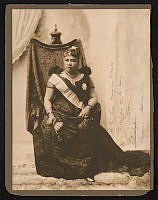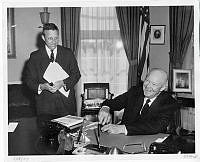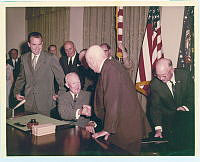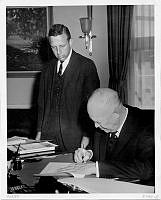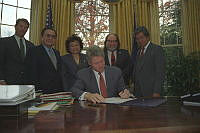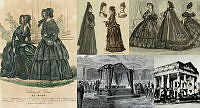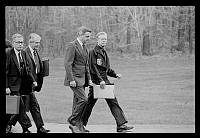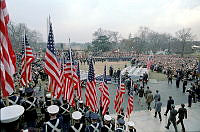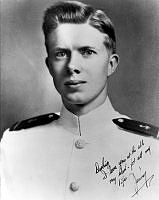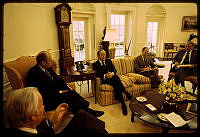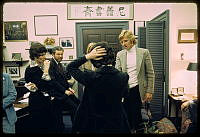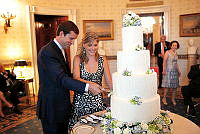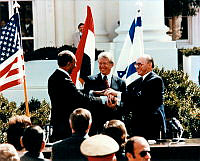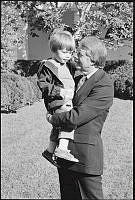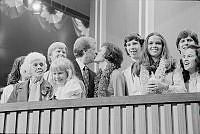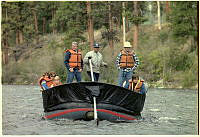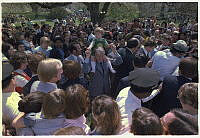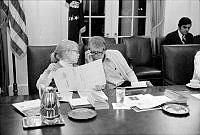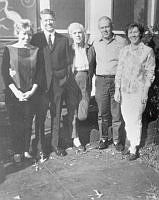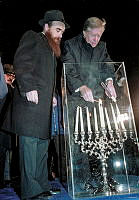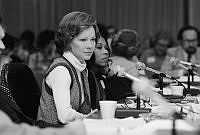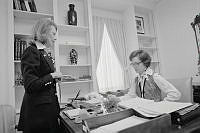The Midnight Appointments
Copyright © Spring 2000 White House Historical Association. All rights reserved under international copyright conventions. No part of this article may be reproduced or utilized in any form or by any means, electronic or mechanical, including photocopying, recording, or by any information storage and retrieval system, without permission in writing from the publisher. Requests for reprint permissions should be addressed to books@whha.org
History has given us the image of a petulant President John Adams staying up to all hours of the night in his last days in office in March 1801, commissioning Federalist party members as judges throughout the land. With the ink still fresh on the last of his “Midnight Appointments,” he rode out of town and refused to attend the Republican Thomas Jefferson’s inauguration. The story has certain elements of truth. But the dynamics behind the scenes were far more complicated. President Adams’s time in the White House deserves a closer look. It was a time of severe personal and political trial for him. His policies had split his own party; the electorate thrust him from the presidency; and he was hurt by a family tragedy.
In the late fall of 1800, President Adams journeyed from Massachusetts to the new capital with foreboding. No doubt, the crowds that feted him along the way raised his spirits. Perhaps all was not lost. Perhaps the cheers reflected sentiment that would reelect him. His son John Quincy Adams, although several months behind the news from America, saw things much more clearly and dispassionately from his diplomatic post in Berlin. He wrote his father that he had “scarce a doubt but that a change will take place at the ensuing election which will leave you at your own disposal.”1 Deep down, the president knew that his son was right, but part of him still hoped he was wrong.
Feeling isolated and lonely, Adams summoned his wife to his side as soon as he reached Washington. The day after arriving at the President’s House with his servant, Adams wrote his beloved Abigail: “The building is in a state to be habitable. Now we wish for your company.” At 65, he was too old to face the business of government and his probable loss of the presidential election alone. “It is fit and proper that you and I should retire together and not one before the other,” he wrote.2 Abigail joined him two weeks later. Because of his policies, President Adams had become a man without a party, and for that reason he feared that he would be a man without friends in Washington. In May 1800, he had dismissed half his cabinet because he found that they had been working against him, often taking orders from Alexander Hamilton rather than from himself. In the ensuing election, vice presidential candidate Hamilton had denounced President Adams as fundamentally unfit for the office, and this faction of high Federalists tried to place Hamilton ahead of the nominal presidential candidate in the election (as was possible in the days before the 12th Amendment). Few Federalist leaders were still on speaking terms with the president.
Despite his troubles with the election and his party, or perhaps because of them, public concerns remained paramount in Adams’s mind. While summoning Abigail, he cut short the personal sentiments: “Before I end this letter,” he wrote, “I pray Heaven to bestow the best of Blessings on this House and all that shall hereafter inhabit it. May none but honest and wise Men ever rule under this roof.” When Adams turned to the business of being president, he found that there was much to be done. “I am so engaged in indispensable business, that I know not how to leave it,” he wrote Abigail.3

John Adams sat for this portrait by John Trumbull when he was vice president (c. 1792-93). It now hangs in the Blue Room at the White House.
White House Historical Association (White House Collection)Adams had been away from the seat of government since May and was greatly behind on his work. To be sure, he had conducted much of his job by mail, but some tasks required his presence, and he had to prepare for the upcoming session of Congress. In addition, unexpected business began to crop up, as it always did. On November 8, the secretary of the treasury Oliver Wolcott tendered his resignation, effective the end of December. The president had to find a replacement willing and able to fill the post for what would probably be the final two months of the administration.4 More important, international affairs loomed large. About the same time he heard from Wolcott, Adams received unofficial word that diplomats in Paris had reached a settlement of the undeclared war between the United States and France. As president, it would be his duty to see the convention with France through the Senate.5
Amid discussions with cabinet heads and political leaders, overseeing the process of settling the government in its new home, and the ever-present rush of office-seekers, Adams and Secretary of State John Marshall had to put together an annual message to help set the agenda for the coming session. By the time he received official word that quorums were present in the houses of Congress on November 21, the message was ready, and the president delivered it in the partially finished Capitol the next day. Adams began the message by congratulating the people of the United States and their representatives upon their successful arrival in their new permanent residence. Both he and his new country had come a long way from the Stamp Act resistance of the mid-1760s. The man who had been the “Atlas of Independence” in 1776 now stood before the Congress of the new Union, in its republican St. Petersburg.6 “It would be unbecoming the representatives of this nation to assemble for the first time in this solemn temple without looking up to the Supreme Ruler of the Universe and imploring his blessing. May this territory be the residence of virtue and happiness,” he prayed.7
In the body of the message, the president highlighted the issues that would dominate the forthcoming session. He asked Congress to begin organizing the government of the District. “It is with you, gentlemen, to consider whether the local powers over the District of Columbia vested by the Constitution in the Congress of the United States shall be immediately exercised,” he explained, and he gave them some instruction about how to think about the task. “If in your opinion this important trust ought now to be executed . . . you will consider it as the capital of a great nation advancing with unexampled rapidity in arts, in commerce, in wealth, and in population, and possessing within itself, those energies and resources which, if not thrown away or lamentably misdirected, will secure to it a long course of prosperity and self-government.” Beyond the District of Columbia, Adams asked Congress to look into reforming the federal judiciary. “No subject,” he told them, “is more interesting than this to the public happiness, and to none can those improvements which may have been suggested by experience be more beneficially applied.” Finally, he turned to international matters. He urged that Congress maintain the navy it had begun to build during the engagement with France. Regarding France, he said little. The news reports were running ahead of diplomatic correspondence, and he could report only that the first consul, Napoleon, had met with the American envoys and that he hoped an accommodation would be forthcoming.8
After delivering his speech, President Adams returned to President’s House to continue his duties while he awaited official word of a treaty from France and of the election. The presidential electors did not actually meet and vote until December 4, and no one was certain that they would vote as expected. Rhode Island, which the Federalists expected to lose, had gone for Adams. In New Jersey, the Federalists used an old colonial law that did not explicitly bar women from voting to pack the polls in their favor.9 The election came down to South Carolina, and many Federalists hoped that Adams’s running mate, Charles C. Pinckney, would help them carry his home state. Unfortunately for Adams, Pinckney’s Republican second cousin, Charles Pinckney, outfoxed the Federalists in the state and carried it for Jefferson and Burr, for which he was rewarded with a diplomatic appointment to Spain.

A portrait of Alexander Hamilton by John Trumbull (c. 1805), which now hangs in the Red Room at the White House.
The White House Historical AssociationOn December 16, 1800, official word of the South Carolina vote reached the president, but that was only half the story. As he learned of his defeat in the presidential contest, he also learned that his son Charles had died in New York 17 days before, and he reeled from the double blow. Like the loss of the presidency, Adams had known the end was coming for Charles for some time. Charles had drunk himself to death. Although the president bore his public and private grief well, he was inconsolable. The next day, he wrote his youngest son, “The melancholy decease of your brother is an affliction of a more serious nature to this family than any other. Oh! that I had died for him if that would have relieved him from his faults as well as his disease.”10 On December 28, Adams commented to a friend, “The affliction in my family, from the melancholy death of a once beloved son, has been very great & has required the consolation of religion as well as philosophy, to enable us to support it.”11
Tragedy pulled the family together. The two remaining sons wrote their father to reconcile him to his political fate and in the process tried to help him handle the other, more intimate pain as well. Adams lost the presidency, they said, because he refused to truckle to either party but instead played the part of an honest patriot. John Quincy wrote, “Had you been the man of one great party which divides the people of the United States, you might have purchased peace by tribute . . . had you been the man of the other party, you would have left the only favorable moment for negotiating peace to the best advantage. . . . You have therefore given the most decisive proof that in your administration you were the man, not of any party, but of the whole nation.”12 Writing from his law office in Philadelphia, Thomas Boylston Adams wrote similarly, “You are to be relieved from the cares, the high responsibility, & the vexations of guiding the helm of state. Such is the will of the Sovereign people’s representatives. Be it so. You will carry with you into retirement, the gratitude of many, the regret of some, and I confidently trust, the veneration of all your Countrymen, whether friend or foe.”13 President Adams thanked his sons for their kind words and sentiments, and he looked to them for support. In particular, he turned to Thomas, the only son remaining in the country. “The soothing considerations suggested by you my dear son for the consolation of your father endear you to me more than ever. Indeed every letter I receive from you increases my esteem for your character for understanding discretion & benevolence.” “Be not concerned for me,” he reassured his doting Thomas.14
The kind sentiments that poured in from his friends from revolutionary days—John Jay, Lafayette, John Trumbull, and William Tudor—also eased Adams’s burden. Lafayette assured him of the comforts of retirement, informing Adams that he was at home on his estate. “I live with my family, in a rural, solitary, place of retirement. Here I preserve the love, the doctrine, and the independence of true liberty which you have known in me five and twenty years.”15 Tudor suggested that Adams return to Europe as an American minister, but Adams knew that the time had come for him to retire. “I believe however upon the whole I must be a farmer. John of stony field & nothing more (I hope nothing less) for the rest of my life.” Adams tried to reconcile himself to his fate: “The happiest life it will be to me (at least I think so) that I ever led.”16
Amid the rush of business, President Adams scarcely had time to grieve. On December 11 he received an official copy of the convention with France, which he submitted to the Senate on December 15. From the first, Adams feared that securing ratification would be an uphill struggle. Many of the Federalists who dominated the Senate thought the mission to France had been a mistake all along and blamed it and Adams for their recent electoral losses. Because of his support for peace with France and for disbanding the army, the president had run well ahead of the party in the recent election, and the party resented him for it. For those reasons, the Federalists were not inclined to approve of a treaty that gave the United States less than everything it demanded. In particular, Adams expected the convention’s critics to argue that it violated existing treaties with England. To fight that attack, Adams scoured the half-finished city for law books, and he managed to dig up a copy of Emmerich de Vattel’s book on The Law of Nations. He easily found what he wanted from Vattel, but he needed further support, and so he had his son Thomas do the legwork in Philadelphia. “I wish you would look into Grotius & Puffendorf among the rules for the interpretation of treaties, & send me extracts of the law upon this point.”17 The senators may have accepted Adams’s legal authorities, but they rejected the convention on January 23, 1801. On matters of national importance, however, Adams did not give up easily, and the Senate ratified a slightly modified version of the convention on February 3.
Unlike some of the others in Washington that winter, Adams did not fear for the Union. He was confident that the Constitution would carry the nation through the storm.
Once the treaty passed, President Adams focused more intently upon issues closer to home. In the realm of politics, he watched as the partisans of Thomas Jefferson and Aaron Burr jostled for favor in Congress. His ironic streak was probably amused by the political crisis that excessive partisanship had caused. Because presidential voting did not at that time differentiate presidential and vice presidential votes, the Republicans’ party-line voting gave Jefferson and Burr an equal number of electoral votes, and for that reason the House of Representatives, with one vote per state delegation, would decide the election. Adams stayed away from the maneuvering, though he did express his belief that Jefferson deserved the honor and would ultimately prevail. Unlike some of the others in Washington that winter, Adams did not fear for the Union. He was confident that the Constitution would carry the nation through the storm. There was “no more danger of a political convulsion, if a President, pro tempore, of the Senate, or a Secretary of State, or Speaker of the House, should be made President by Congress, than if Mr. Jefferson or Mr. Burr is declared such.”18
As he watched the election, Adams tended to affairs of state, in particular to the judiciary. His first order of business was to find a new chief justice. On December 15, Adams received a letter from Chief Justice Oliver Ellsworth resigning his post. Ellsworth, who had been among the American diplomats sent to France, was “constantly afflicted with the gravel and the gout in my kidneys,” and for that reason he was “not in a condition to undertake a voyage to America at this late season of the year; nor, if I were there, should I be able to discharge my official duties.” He therefore resigned his post and determined to spend the winter recovering from his illnesses in the South of France.19
As he mulled over the situation, Adams determined to place someone of sound principles and of undeniable stature in the post, to ensure that whatever the future held for the electoral branches of the government, the judiciary would remain firm and well respected. Across the country, there was much speculation about who would and should be the new chief justice. The lead ing members of the New Jersey bar flattered Adams, suggesting that he should nominate himself for the post.20 John Jay came to mind, and Adams submitted his name to the Senate for confirmation, though he feared he had acted impulsively. The problem was not one of capacity or of stature, for Jay was respected as an old patriot and had but recently served ably as chief justice. The problem was few believed that he would take the job. Timothy Pickering, still smarting at his dismissal as secretary of state, remarked acidly, “The P. as well as everybody else must know that Mr. Jay will not accept the office. He formally announced to the Legislature of New York his determination to retire from public life, on account of his advanced age and infirmities. Under such circumstances, nobody but Mr. A. would have made the nomination without consulting Mr. Jay.”21

Thomas Jefferson, portrait by John Trumbull, 1788.
White House Collection/White House Historical AssociationAdams knew that Jay would not be inclined to return to his old post, but he probably thought he could convince Jay to accept it as a matter of patriotic duty. On December 19, Adams wrote Jay, “In the future administration of our country, the firmest security we can have against the effects of visionary schemes or fluctuating theories, will be in a solid judiciary; . . . You have now a great opportunity to render a most signal service to your country. I therefore pray you most earnestly to consider it seriously, and accept it.” In summing up his case, Adams acknowledged that the appointment had been presumptuous, but he believed it had also been justified: "I had no permission from you to take this step, but it appeared to me that Providence had thrown in my way an opportunity, not only of mark ing to the public the spot where, in my opinion, the greatest mass of worth remained collected in one individual, but of furnishing my country with the best security its inhabitants afforded against the increasing dissolution of morals.”22
Adams waited impatiently for Jay’s answer. Meanwhile, he prepared for the possibility that Jay would decline the post, but he did not like his options. Perhaps he might appoint William Cushing, the senior associate justice, and nominate someone else to fill his place. The problem was that Cushing was 68 years old, and his abilities were on the wane. Should Cushing decline, as was likely, Adams planned to nominate William Paterson, who was next in the order of seniority, and still vigorous at 56.23 Adams did not want to slight Cushing by passing him up, but he did not particularly want to nominate him either. Secretary of State Marshall wrote, “Should he [Jay] as is most probable decline the office I fear the President will nominate the senior Judge.”24 Jay took his time answering, but ultimately declined the post.
After receiving word from Jay, Adams had to work quickly. Congress was about to consider a judiciary bill that would reduce the Supreme Court from six to five justices, in order to prevent ties from occurring, and Adams realized that it would be bad form to nominate a sixth member to the court when the bill was being formally debated. To prevent that difficulty, Adams either had to elevate a current associate justice and nominate a new one at the same time, or choose someone else from the outside. With the clock winding down on his administration,he did not have time to suffer another rejection. Jared Ingersoll, Adams’s choice for the vacant associate justice seat, was dawdling about his response. Despite repeated importunings by the president’s son in Philadelphia, Ingersoll remained irresolute.25
Finally, on January 19, the Congress had Secretary of the Navy Benjamin Stoddert, one of the few Federalists who was still speaking to Adams, remind him that “as the bill proposes a reduction of the Judges to five,” he ought to act before the bill came up for consideration.26 Although the record is inexact about what happened next, the available sources indicate that something like the following transpired. Later that day, as luck would have it, the secretary of state stopped by the President’s House to discuss some official business. Some time after Marshall’s arrival, the president asked him what to do about the court. “Who shall I nominate now?” Marshall records Adams asking him. The secretary of state had no response. Then in a characteristic flash of impetuousness, Adams wheeled about and said, “I believe I must nominate you.” The president’s decision struck Marshall, and he “bowed in silence.”27

The Marquis de Lafayette, Sevres 1904, after Jean-Antoine Hondon's 1790 portrait bust in marble made during Lafayette's brief triumph in the French Revolution. It is now in the Cross Hall at the White House.
The White House Historical Association/ White House CollectionThe Federalists in the Senate reacted to the nomination with mixed emotions. Marshall came from the president’s wing of the party, not their own. Moreover, because no one had mentioned Marshall’s name in connection with the post before, the appointment surprised them. No doubt, they thought, the unstable fool Adams had been at it again. Fortunately for Marshall, the Senate had little choice in the matter, and after a week of trying to persuade President Adams to change his mind, the senators assented to the nomination. As the years passed, Adams congratulated himself for his wisdom. In 1825 he wrote, “The proudest act of my life was the gift of John Marshall to the people of the United States.”28
After confirming Marshall and ratifying the convention with France, Congress finally took up the judiciary bill, passing it on February 13, 1801. The bill provided many beneficial reforms. The First Congress had cobbled the original Judiciary Act of 1789 together in a hurry, as it tried to get the government up and running. The plan was to revisit the issue when time permitted. As is so often the case with such efforts, Congress never seemed to get around to the revision, despite repeated calls for changes in the statute by the justices. Finally, the Sixth Congress began to consider the issue in the spring of 1800 and spent about a month examining, debating, and revising a new judiciary act, but in the end suspended action on the mea sure. With the loss of power imminent, the Federalists renewed their efforts to reform the judiciary, and finally did so. In addition to eliminating one justice, the act divided the Union into 16 districts, which, in turn, were organized into six circuits, creating 16 new circuit judges. Thus the justices of the Supreme Court would no longer have to ride the circuit, an arduous duty in an expansive nation with poor roads and public lodgings. The bill’s passage meant that there were many new offices to fill, and Congress turned to President Adams to fill them.
Once the Judiciary Act passed, Adams had a few days more to reflect upon his choices while the House of Representatives sought to settle the presidential election. By this time, however, he was alone with his thoughts, as Abigail had left town the first week of February so that she could prepare the house in Quincy for his return and stop off in Philadelphia to see Thomas. After four days and 35 ballots, the election finally went to Jefferson. As he went about the business of closing his administration and preparing to return to Quincy, the president quickly readied his nominations. “The burden upon me in nominating Judges and Counsels and other offices, in delivering over the furniture, in the ordinary business of the close of the session, and in preparing for my journey of 500 miles through the mire is and will be very heavy,” he wrote Abigail on February 16.29 Despite the press of public duties, Adams nominated most of the judges on February 20, and by February 24 he had nominated the rest.30
For weeks before the bill became law, the president had been receiving informal nominations for the posts, and even occasional solicitations, as had members of Congress. In that day and age, office-seekers were less brazen than they tend to be today. One letter writer even confessed, “There is something awkward in applying ... for an office before it is created.”31 Because he had been contemplating the new posts since his annual message the preceding November, and because he was surrounded by politicians who were more than willing to help him pick men for the new courts, Adams had little trouble filling the offices. As he made the nominations, however, he determined not to choose men according to partisan or personal considerations, but instead to find the men best suited for the positions. Although most of his nominees were Federalists, Adams did not recruit active partisans. Some of the judge-ships went to Republicans; and in a few states the parties were not so well formed that the men Adams nominated had a definite party identification. That was why the Senate rubber-stamped so many of them, and Republicans actively opposed only one of them. In general, Adams recruited an able group.
As he[Adams] made the nominations...he determined not to choose men according to partisan or personal considerations, but instead to find the men best suited for the positions. Although most of his nominees were Federalists, Adams did not recruit active partisans.
Once he had made the judicial nominations, Adams’s chores only increased. On February 24, Congress finally passed legislation organizing a government for the Federal City, and Adams had to appoint not only three more judges but also many other officers, notably justices of the peace. For the most part, these were the nominations that were signed in the last hours of the Adams administration, mostly by the secretary of state. Adams also had to take care of a few circuit judges in cases where the original appointee turned down the post. To fill the posts in the capital, the president had to find people who could do the jobs and were willing to live in Washington, a city that would be largely empty for much of the year. Commissioning the offices in the Federal City took a good deal of time, but by March 2 it was largely done. On his last day in office, March 3, 1801, President Adams only signed a few commissions, all by 9:00 p.m.
The legend of the “Midnight Judges” grew out of the concatenation of discrete events. The executive department filled many posts in a flurry that continued up to the last day of the Adams presidency. The judicial appointments were made late in the lame duck session of Congress, though not at its very end. And there was probably no one Jefferson hated more than his cousin John Marshall. Although Jefferson would have preferred to staff the offices in Washington himself, he really had no quarrel with most of Adams’s appointees. He reappointed 25 of the original 42 justices of the peace in Washington (after Congress reduced the total to 30).32 In 1805 he even elevated Adams’s nephew William Cranch from the judgeship to which Adams had appointed him to the post of chief justice of the federal court of the District of Columbia.
As for the circuit appointments, one suspects that Jefferson and his party objected to the fact of their existence more than the means by which they were created. The Republicans never liked the Judiciary Act of 1801 because they saw it as a means of projecting federal power into the states, and they repealed it shortly after taking power. But John Marshall remained, anchoring the Supreme Court long after Jefferson served his two terms. Marshall was probably the only person in Washington who had the intelligence and the finesse to outduel Jefferson in political combat, and Jefferson always resented his appointment. Jefferson’s loathing of Marshall fed his condemnation of the “Midnight Judges,” the spectacle of commissions being signed in the dying hours of the Adams administration becoming a trope for personal pique.

This portrait of John Marshall by John Wesley Jarvis was done while Marshall was Chief Justice of the United States Supreme Court. Prior to that appointment, he served as secretary of state under President John Adams.
White House Collection/White House Historical AssociationWhat was Adams thinking as he made the final appointments? No one can deny that part of Adams’s motivations was his resentment of the party that had booted him from office and his distrust of the men they would nominate, but there was more to it than that. Adams had faith in the constitutional system, and when push came to shove he did not really worry about what Jefferson would do. Adams did not think of himself as a “lame duck.” He saw no reason why he should cease to exercise the powers of the office just because he would soon no longer hold them. From Adams’s perspective, the effort to personalize offices smacked of monarchy and arbitrary government, and he opposed it. That was what he meant in 1787 when he wrote, “It is the laws alone that really love the country, the public, the whole better than any part.”33 It was not the president’s job to surround himself with appointees he could easily control, as Jefferson seemed to think. Moreover, Adams realized that the next Congress would not convene until December 1801. The president probably thought it a duty to get the new judges out to their posts and to get the government of Washington up and running as well, while Congress could still advise and consent.
If he was not making appointments and signing commissions on his last day in office, what was President Adams doing? By and large, he was preparing to return to Quincy. On March 2, 1801, the president’s nephew and assistant, William Smith Shaw, wrote his Aunt Abigail who had left Washington a few weeks before, “For a few days, every moment of my time has been so completely occupied in official duties, that I have had hardly a moment’s time to write or even to think for myself. . . . The President has nominated all the officers for this district. . . [and] we shall leave this city on Wednesday morning.”34 His last day in office, Adams was probably busy packing his papers in the big square office he occupied on the second floor of the White House. He also had one final task. In the Adams Papers, there are five pages of ledgers dated March 3, 1801, on which the president calculated what his expenses had been as president, and how much of his salary the country still owed him. After adding it up, Adams found that he still had $13,000 coming to him to use in his retirement. It was the least the country could give an honest patriot who had dedicated his life to its service.
The next morning at dawn. President Adams got up and rode out of town to begin the long journey back to Quincy. He did not wait to see President Jefferson’s inauguration. We do not know why he did that. After all, no customary etiquette for the transfer o f power had yet been created. It may have been resentment, but it may also have been that he was not formally invited and he did not want to presume that his presence was desired. It is also possible that Adams had felt that George Washington had upstaged him in 1797 when he was inaugurated, and he wanted to set a precedent that would prevent a like occurrence from happening again. The best explanation, however, is that he was simply anxious to get home to his beloved wife and his farm. He wanted to lick his wounds as a rejected president, and grieve as a father.













